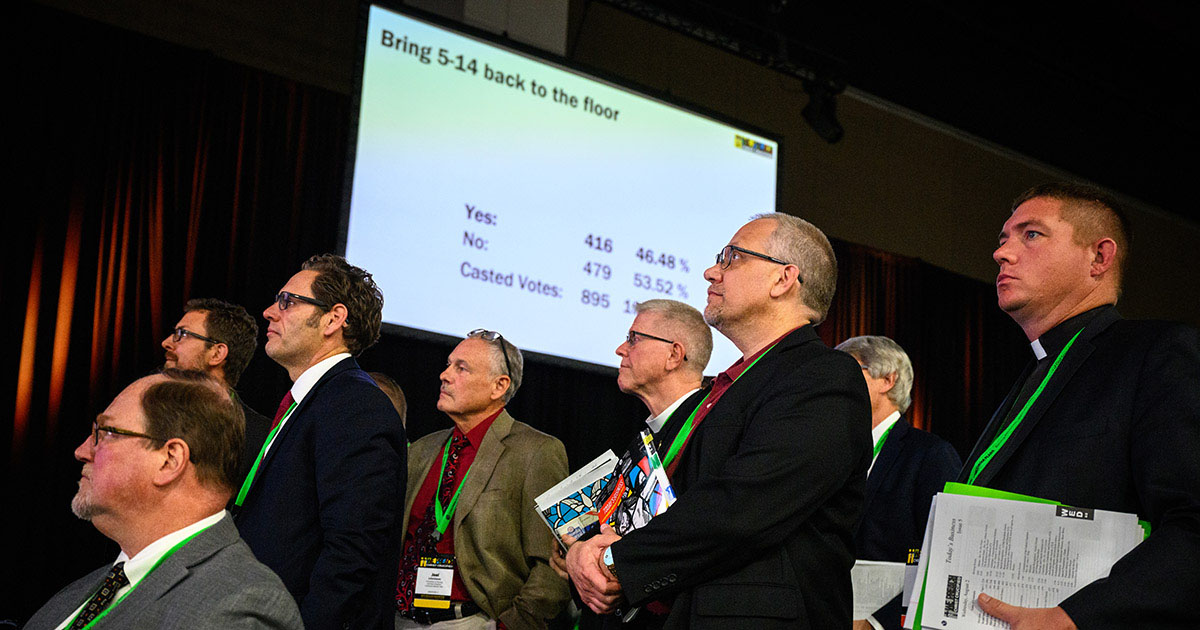
By Roy S. Askins
MILWAUKEE — On Wednesday, Aug. 2, Floor Committee (FC) 5 on Theology and Church Relations resolved its remaining business at the 68th Regular Convention of The Lutheran Church—Missouri Synod (LCMS). The slate of resolutions provided guidance regarding the Lord’s Supper, Lutheran education and the use of technology in the church.
Resolutions 5-09 and 5-15 dealt with different aspects of the Lord’s Supper. The former resolution re-affirms the LCMS’ historic position regarding close(d) Communion, the latter the reverential administration.
Before moving to the body of the resolution, LCMS President Rev. Dr. Matthew C. Harrison briefly offered a threefold explanation for the practice of closed Communion. “First … we really are concerned that people who receive the Sacrament are Christians. None of us wants to, as Paul says, give the Sacrament to somebody for their detriment,” he said, referencing St. Paul’s teaching in 1 Corinthians 11.
Second, Harrison also mentioned the repeated injunction of Scripture for complete unity in doctrine and teaching. Finally, he explained pastoral discretion. The LCMS has always acknowledged that pastors have discretion to make certain allowances based on circumstances. But Harrison also warned against the abuse of such practice: “Printing in your bulletin ‘If you believe in the real presence, y’all come’ is not pastoral discretion.”
The resolution, which was adopted by 88.91%, enumerates a number of previous resolutions upholding the practice of closed Communion that were adopted by past conventions. It then charges the Synod president and Council of Presidents (COP), in consultation with the two seminaries of the Synod, to provide case studies and discussions for use within districts of the LCMS.
To address concerns related to the use of pre-packaged elements, the delegation adopted Res. 5-15, “To Uphold Proper Elements and Reverential Administration of the Lord’s Supper.” It directs congregations to treat reverentially the elements of the Lord’s Supper and the Commission on Theology and Church Relations (CTCR) to take up the concerns for further study.
Regarding the use of technology in the church, particularly in reference to worship, the delegation passed Res. 5-13A. As a result of this resolution, the COP, the Office of the President and the CTCR will develop a process allowing for discussion and input from people with “divergent and diverse positions” regarding such practices as “virtual” worship, online Bible studies and more.
The remaining resolutions directed the CTCR to “develop principles of Lutheran education” (Res. 5-10), reaffirmed the Synod’s position on marriage and sexuality (Res. 5-11), and asked the CTCR to prepare a document on sharing the Gospel in a post-Christian context (Res. 5-12).
Res. 5-14A, “To Address Release and Use of Luther’s Large Catechism with Annotations and Contemporary Applications,” was withdrawn from consideration by FC 5.
“I’m encouraged by the high percentage of affirmative votes for all those resolutions on closed Communion, the use of online technology and reverential treatment of the elements of the Lord’s Supper,” said the Rev. Peter Brock, first vice-president of the LCMS Indiana District and secretary for FC 5. “I’m very encouraged and thankful that for the most part there’s widespread unity and agreement within our church body.”
Posted Aug. 2, 2023
2023 LCMS Convention
Under the theme “We Preach Christ Crucified,” the 68th Regular Convention of The Lutheran Church—Missouri Synod met July 28–Aug. 3, 2023, at the Baird Center in Milwaukee.
There are several ways to get convention news, including:
Web
• lcms.org/convention/national
Video
• lcms.org/convention/national/livestream
Social media
Audio
• kfuo.org